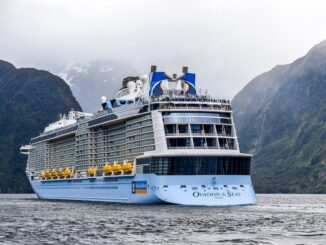Plans to achieve carbon-free cruising by 2050 have been revealed by the Royal Caribbean Group.
The cruise company, which owns Royal Caribbean International, Celebrity Cruises and Silversea Cruises, has announced a set of sustainability initiatives aimed at achieving zero net emissions by the target date.
The Destination Net Zero plan follows the news that the group’s luxury line Silversea will launch what it claimed to be the first hybrid-powered cruise ship in 2023.
Richard Fain, Chairman and CEO, Royal Caribbean Group, said:
“Decades ago, we set out on a course to advance sustainability; our vision now is to realise carbon-free cruising over the next two decades. Today we are announcing the most important destination of all in our company’s history, Destination Net Zero, an ambitious strategy to cut emissions, protect our oceans, and ensure the viability of the hundreds of destinations that our guests and crew members care deeply about.”
Destination Net Zero is based around a four-pronged approach which includes modernising the brand’s fleet through the introduction of 13 new energy-efficient and alternatively fuelled vessels; investing in energy-efficient programmes; developing alternative fuel and power solutions and improving shore-based supply chains.
At the visible forefront of the programme will be the new class ships, known as Project Evolution, which will use three sustainable power sources – a fuel cell system, battery technology and dual fuel engines using liquefied natural gas (LNG) as the main fuel. The group says this will allow ships to utilise shore power and connect to the local grid and be totally free of emissions while in port.
Fain added:
“Silversea’s newest ship class is a significant leap forward in our commitment to sustainable ship design and our journey to reduce our environmental footprint. We first announced our fuel cell ambitions several years ago. Through dedication and perseverance, we are now proud to introduce the first ship with large-scale fuel cell technology capable of achieving emission-free port operations.
“Incorporating fuel cells into our ships now is one example of how Royal Caribbean Group is preparing to use new technologies as we move to a non-carbon-based future.”
Royal Caribbean Group’s environmental efforts began nearly 30 years ago with Save the Waves, which grew from a recycling programme into a company-wide approach to achieve sustainability targets across the group. In 2016 the group formed a partnership with the World Wildlife Fund (WWF) with the goal of ensuring the long-term health of the oceans and fulfilling a vision of more sustainable cruising.
Earlier this year it announced it had met or exceeded its 2020 goals, with the exception of a sustainable seafood sourcing target, now expected to be met by 2022, that was impacted by the travel suspension from the Covid-19 pandemic.
Silvia Garrigo, the group’s Chief Environmental Social Governance Officer, concluded:
“Destination Net Zero will help guide our decision-making in the years to come and builds on Royal Caribbean Group’s continuous improvement mantra. While we may not have all the answers now, this comprehensive company-wide strategy amplifies our focus on long-term emissions reduction and provides us a roadmap for how to get there.”
Known as the ‘River Cruise Queen’, Jeannine Williamson is an award-winning travel writer, cruise expert and our cruise correspondent, who has clocked up thousands of nautical miles.
Photograph courtesy of Royal Caribbean Group




Be the first to comment